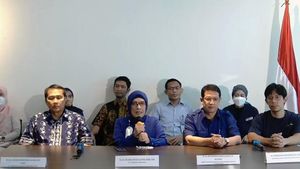JAKARTA - The Attorney General's Office (AGO) released data on work achievements in the general criminal field (Pidum) during the period from July 22, 2020 to July 11, 2023. According to the AGO's records, prosecutions of 3,121 cases were terminated using a restorative justice approach.
The Deputy Attorney General for General Crimes (Jampidum) of the Attorney General's Office, Fadil Zumhana, as quoted from Antara, Saturday, July 22, said that the implementation of the termination of prosecution based on restorative justice is a legal breakthrough aimed at providing useful and fair legal application by providing space and opportunity for the perpetrators to restore relations and correct mistakes against victims outside the court (non-judicial settlement).
so that the legal problems arising from the occurrence of criminal acts can be resolved properly in order to achieve approval and agreement between the parties while at the same time restoring social conditions in the community.
"The application of restorative justice is a public legal necessity globally," said Fadil.
Fadil said there are things that need to be observed in the application of restorative justice, namely who is the authority to apply restorative justice to be carried out in every legal system.
According to him, it is important to pay close attention to uniform management and avoid overlapping authority based on legal principles.
Because in the law enforcement process, he continued, there are legal principles that apply and are universally recognized, one of which is the hope of death.
"Asasul Litis has placed the prosecutor as the only party to control and direct the case," he said.
Therefore, he said, the legal direction of a process from the investigation stage will be assessed by the Prosecutor whether or not the prosecution can be carried out, the prosecutor's assessment is not only in the aspect of formal and material completeness, but also aspects of benefit that will be obtained.
SEE ALSO:
He emphasized that this aspect of benefit is important in realizing restorative justice because that is where there is the authority for prosecution discretion, this is a form of the authority of the Prosecutor that other law enforcers do not have.
The judge does not have the authority to reject the case, nor does the investigator have no discretion in stopping the investigation except for reasons that are regulated according to the procedural law.
"This authority places the prosecutor as a legal guard who determines whether a case is appropriate or unfit for trial," Fadil explained.
He continued that when a case is terminated or forwarded to court, it is hoped that it will have an impact that can bring justice more appropriately, namely providing certainty, justice and benefits to all parties. The Indonesian Prosecutor's Office has implemented restorative justice since the issuance of the Regulation of the Prosecutor's Office of the Republic of Indonesia Number 15 of 2020 concerning Termination of Prosecution Based on Restorative Justice on July 22, 2020.
"The Prosecutor's Regulation on Restorative Justice was born to break the deadlock or vacuum of material law and formal law that has not yet regulated the settlement of cases using a restorative justice approach," he said.
The concept of restorative justice is based on Law Number 11 of 2012 concerning the Juvenile Criminal Justice System, which is intended only for child offenders; and the Prosecutor's Regulation on Restorative Justice, which is intended for adult perpetrators.
The two regulations serve as a reference for implementing restorative justice as a modern approach in resolving criminal cases.
Through this Prosecutor's Regulation on Restorative Justice, finally the application of restorative justice can reach all levels of age and has actually made law for humans.
The presence of this Prosecutor's Regulation is expected to further inspire the conscience of the prosecutors as the controller of criminal cases in seeing the legal reality if there are still many small and underprivileged people who have difficulty getting access to legal justice.
"The Prosecutor's Office will present legal justice that brings benefits and at the same time legal certainty for all parties based on conscience," said Fadil.
In optimizing the application of retorative justice, the Indonesian Attorney General's Office already has 3,535 Restorative Justice (RJ) houses spread throughout Indonesia.
Another performance achievement in the field of general crimes is that the Indonesian Attorney General's Office completed 387,935 cases at the pre-prosecution stage, 341,213 cases were resolved at the prosecution stage, and as many as 320,853 convicts had been executed whose cases had permanent legal force.
Jampidum Kejaksaan Agung RI juga sedang membangun keadilan restorative melalui hukum pidana 4.0 (digital transformation).
The English, Chinese, Japanese, Arabic, and French versions are automatically generated by the AI. So there may still be inaccuracies in translating, please always see Indonesian as our main language. (system supported by DigitalSiber.id)













